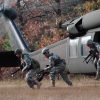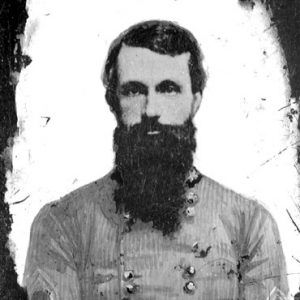calsfoundation@cals.org
Daniel Chevilette Govan (1827–1911)
Daniel Chevilette Govan participated in many of the bloodiest battles of the Civil War in Tennessee and elsehwere but lived into the twentieth century, following many career paths through his long life.
Daniel C. Govan was born on July 4, 1827, in Northampton County, North Carolina, to Mary Govan and Andrew Govan, who served as a U.S. representative from South Carolina. In 1832, the family relocated to Marshall County, Mississippi, where the young Govan was raised. He received his primary education from private tutoring and then attended South Carolina College (now the University of South Carolina). He left before graduating, for unknown reasons.
Like thousands of other prospectors seeking their fortunes, Govan participated in the 1849 California gold rush alongside his cousins Benjamin and Henry McCulloch, who would also become Confederate generals. In 1850, Govan was elected deputy sheriff of Sacramento, California, and, two years later, he returned to Mississippi and took up work as a planter. He relocated to Arkansas, settling near Helena (Phillips County) in early 1853, and returned to farming. That December, Govan married Mary Fogg Otey, the daughter of James Hervey Otey, the first Episcopal bishop of Tennessee; they had fourteen children together.
At the start of the Civil War in 1861, Govan raised a company of men from the Helena area and was appointed a captain in the Arkansas state forces. Later that year, he was elected lieutenant colonel of the Second Arkansas Infantry and was appointed colonel of the regiment in January 1862. Govan and the men of the Second Arkansas participated in several battles, including Shiloh, Perryville, Stones River, Chickamauga, Missionary Ridge, and Ringgold Gap. At Ringgold Gap, Govan, along with three other officers, received high praise from division commander Major General Patrick Cleburne, who wrote, “Four better officers are not in the service of the Confederacy.”
On December 29, 1863, Govan was promoted to brigadier general. He was given command of the Fifth, Sixth, Seventh, and Ninth Arkansas Infantry regiments. “Govan’s Brigade” fought against the invading Union army during the Atlanta Campaign and at the battles of Pickett’s Mill and Jonesborough. At the Battle of Jonesborough on September 1, 1864, Gen. Govan was captured, along with 600 of his men. He was exchanged for Union general George Stoneman one month later.
Govan and his men served throughout the rest of the war assigned to the Army of the Tennessee. They participated in the Battle of Franklin on November 30, 1864. Gen. John Bell Hood, commanding the Confederate forces, ordered Cleburne to tell his men not to fire their guns but rather to storm the Union works by the point of the bayonet. Years later, Govan recalled his last meeting with his division commander. Govan said that he thought Cleburne was “greatly depressed” as he told his brigade commanders of Gen. Hood’s orders and that the Federal works had to be taken at all costs. Govan saluted and said, “Well General, few of us will ever return to Arkansas to tell the story of this battle.” Cleburne simply replied, “Well, Govan, if we are to die, let us die like men.” Cleburne, along with four other Confederate generals, were killed at the Battle of Franklin.
Two weeks later, during the Battle of Nashville, Govan received a severe wound to his throat. However, his wound did not stop him from continuing to fight with his brigade in the battles for the Carolinas.
Govan surrendered in April 1865 along with Gen. Joseph E. Johnson at Greensboro, North Carolina. He was paroled on May 1 and received a pardon from the U.S. government in December. After the war, Govan returned home to Helena and resumed farming his land. In 1894, he moved to the state of Washington after being appointed by President Grover Cleveland to the job of government Indian agent at the Tulalip Agency near Everett.
After leaving his government post, Govan spent the rest of his life traveling around the country visiting his children. Govan was active in the United Confederate Veterans organization and was the featured speaker at a joint reunion of Union and Confederate veterans held in Seattle, Washington, in 1894. At the conclusion of his speech, Govan noted, “Of the dead soldier, whether he wore the blue or the gray, whether officer of high rank whose last resting place is marked by beautiful monumental shaft recording his deeds and achievements, or the unostentatious private over whose unmarked grave the flowers of thirty springs have blossomed and the snows of thirty winters have fallen, we can all unite in saying: Their swords are rust, the bodies are dust, And their souls are with God, we trust.”
He died on March 12, 1911, at the home of a daughter in Memphis, Tennessee. At the time of his death, only three of his fourteen children were still living. His body was taken to Holly Springs, Mississippi, and he is buried at the city’s Hillcrest Cemetery in the family plot.
For additional information:
Barnhill, Floyd R., Sr., with Calvin L. Collier. The Fighting Fifth: Pat Cleburne’s Cutting Edge, The Fifth Arkansas Infantry Regiment, C.S.A. Jonesboro, AR: 1990.
Brown, Norman D., ed. One of Cleburne’s Command: The Civil War Reminiscences and Diary of Capt. Samuel T. Foster, Granbury’s Texas Brigade, CSA. Austin: University of Texas Press, 1980.
Daniel C. Govan Papers. Southern Historical Collection, Wilson Library. University of North Carolina at Chapel Hill, Chapel Hill, North Carolina.
DeBlack, Thomas A. With Fire and Sword: Arkansas, 1861–1874. Fayetteville: University of Arkansas Press, 2003.
McDonough, James Lee, and Thomas L. Connelly. Five Tragic Hours: The Battle of Franklin. Knoxville: University of Tennessee Press, 1984.
Sword, Wiley. Embrace an Angry Wind: The Confederacy’s Last Hurrah: Spring Hill, Franklin, and Nashville. New York: Harper Collins, 1992.
Sutherland, Daniel E. “No Better Officer in the Confederacy: The Wartime Career of Daniel C. Govan.” Arkansas Historical Quarterly 54 (Autumn 1995): 269–303.
Thomas, David. Arkansas in War and Reconstruction. Little Rock: Central Printing Company, 1926.
Yeary, Mamie, compiler. Reminiscences of the Boys in Gray. McGregor, TX: 1912.
Steven L. Warren
Overland Park, Kansas






Comments
No comments on this entry yet.